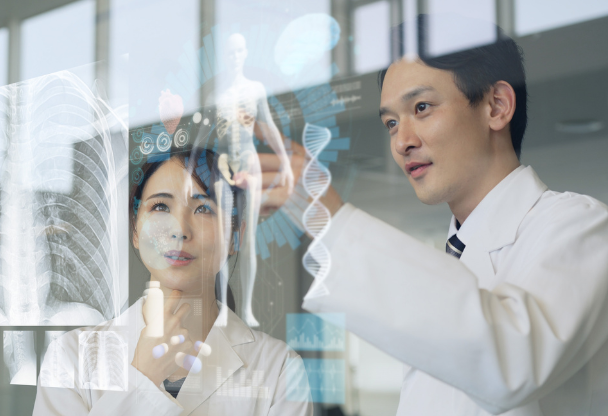When AI and machine learning are implemented in a lifesaving industry like healthcare, they can significantly impact our quality of life. More and more healthcare organizations are aware of their vast potentials when the global AI in healthcare market size is expected to expand at a compound annual growth rate (CAGR) of 38.4% from 2022 to 2030 (Grand View Research, 2021).
This article will illustrate some positive impacts of AI and machine learning on our way of living that businesses can relate to deliver more value for their end users.
A Glance at the Positive Impact of Machine Learning
Machine learning is a branch of AI that uses massive amounts of data and sophisticated algorithms to teach computers how to recognize patterns and make decisions on their own. AI-driven systems can progress themselves over time just by observing their surroundings. Intelligent automation is a use case that AI and machine learning can help organizations boost their operational efficiency. Approximately 45% of operations in the workplace can be automated using existing technology, according to the McKinsey Global Institute, with 80% of it due to machine learning capabilities.
Machine learning solutions are now being used in several sectors, including but not limited to customer service, logistics, healthcare, travel, retail, financial services, manufacturing, etc. Each of these industries leverage machine learning applications for addressing specific problems in their own fields, but they all have the same overarching goal: to create data models that enable businesses to more rapidly spot lucrative possibilities and prevent threats.
.png?width=608&name=Website%20Image%20Template%20%20(7).png)
Moreover, our society can reach to its utmost potential with AI-driven inventions like autonomous transportation or smart assistants to automate unproductive works. Now that individuals do not have to spend so much time on routine, unimportant tasks, they can invest their energy on the projects that will contribute more values to their organizations and civilization.
The critical impact of AI and machine learning on our wellbeing can be easily recognized in the healthcare sector, such as enhancing monitoring and diagnostic capabilities and help healthcare organizations increase their operational efficiency. According to Insider Intelligence (2022), 30% of healthcare costs are associated with administrative tasks, which can be automated with AI and machine learning solutions. The following are popular use cases of how AI and machine learning can transform healthcare operations as well as service quality.

AI and Machine Learning Use Cases in the Healthcare Sector
Today, the healthcare sector is facing a perfect storm of unprecedented proportions. Expenses are growing at an unsustainable pace as our population ages. In this context, the shortage of medical professionals is likely to worsen during the next decade. Research commissioned by the Association of American Medical Colleges (AAMC) projects a shortfall of between 42,600 and 121,300 doctors in the United States by the year 2030.
Clearly, we must increase the productivity of our healthcare providers and the efficiency of their operations. The use of AI and machine learning to assist physicians in their daily work is crucial if we're going to achieve these objectives.
1. Assisted and automated diagnosis and prescription
Various complicated maladies are difficult to identify and diagnose, so patients learn about their ailments late. Using AI for supporting clinical decision, risk assessment, early diagnosis, and prescription is an innovative approach to healthcare data analysis. The capability of AI and machine learning can include automation in diagnosis and prescription by gathering patient data to improve treatment efficiency and prevent disease progression. On the other hand, every healthcare organization wants to minimize chronic illnesses, expensive acute occurrences, and quick deterioration, and AI-driven intelligent systems can overcome these difficulties with their proactive, predictive interventions.
2. AI-powered radiology assistant
Non-invasive radiological imaging techniques like MRI, CT, and x-rays provide insights into the human body's inner workings. Despite the risk of infection, biopsies are regularly employed in diagnostic procedures. The next generation of radiological tools will be made possible by AI, and they will be precise and thorough enough to eliminate the necessity for tissue samples in certain situations. AI can also identify which image areas are questionable and provide an estimated probability that the patient knows the solution. This device will improve radiologists' diagnoses and decrease wasteful imaging procedures.
3. Real-time patient flow optimization
Hospital administration could be improved by AI and machine learning. Several studies demonstrate AI systems can control patient flow, boosting clinical treatment and relieving clinicians of administrative burdens. However, AI is not just about machines replacing humans because they're better. AI will help healthcare practitioners handle vast volumes of data and transform it into life-saving insights. Hospitals can utilize AI and machine learning to analyze and forecast:
- Resource requirements to be optimized in their usage and availability to reduce healthcare expenses.
- Optimize hospital resources to reduce patient waiting times and appointment delays.
- Reduce expenditures by anticipating patients' hospital readmissions.
The study of AI and machine learning will have far-reaching impacts on nearly every facet of people's daily life, from where they live and travel to how they take care of their health. More and more businesses are leveraging these technologies to make their products more useful, and technologies like the Internet of Things and cloud computing are driving this trend. Organizations can gain a competitive advantage by using AI and machine learning to recognize the underlying patterns in the large amounts of data to better serve their customers.
As data-intensive analysis and knowledge-based management are essential components of AI and machine learning initiatives, these tasks need the availability of specific expertise and high data quality. Adnovum can empower your organization to enable machine learning implementation in your current business processes.





